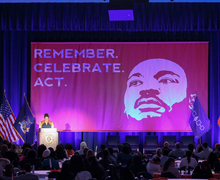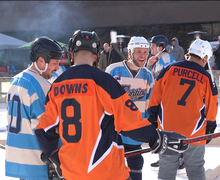Oakland University students hold an ‘Ask a Muslim’ panel to combat Islamophobia
Courtesy of Oona Goodin-Smith
Inspired by an online campaign called "Coffee and a Conversation," students at Oakland University decided to encourage the Muslim Student Association to hold an “Ask a Muslim” panel at the university.
Sumayya Master, a junior marketing major at Oakland University in Michigan, feels her hijab acts like a banner that tells people: “Hey, I am Muslim.” As a result, Master, who is also the president of the Muslim Student Association at OU, said she feels she has an important role in society.
“I am tasked with the responsibility of showing people what Islam is all about. It’s my responsibility to positively represent my religion,” Master said. “In today’s world, I have to be careful not to say anything that may further the stereotypes.”
Master added that sometimes she thinks she has to almost overcompensate to show people that not all Muslims are bad, like the media can show.
Inspired by an online campaign called “Coffee and a Conversation,” Master decided to encourage the MSA to hold an “Ask a Muslim” panel at OU. The panel was part of a larger effort for public outreach to counter Islamophobia and raise awareness.
“Our main goal was just to show like, ‘Hey, we understand how we are portrayed but we want you to understand that we are not actually like that,’” Master said. “We want to promote unity, brotherhood, companionship between Muslims and people of other faiths and identities.”
To draw students into the event, the MSA offered free food to students who engaged with the association and asked questions.
Malik Balla, an associate professor of Arabic studies at OU, said historically, people gather around food to have meaningful conversations.
“Such an event becomes very special because food is life and gives people a chance to talk to each other and care about the life of each other,” Balla said.
Balla added that there is risk in Muslim students holding an event like this. He said before starting a discussion that these students had to make a decision that they would be open to all kinds of questions.
Fortunately for those students at OU, Balla said, there is a large Muslim population in Michigan because it holds the largest mosque in the United States.
But he suggested that other universities be cautious and try to understand the climate of their university before holding similar events. In a more unfriendly climate, an “Ask a Muslim” panel could provoke hateful language rather than opening doors of communication.
Ahmed Naseem, assistant president of the MSA at OU, said some of the main questions asked by students were things like, “What is jihad?,” “Why do you guys pray five times a day?” and “Why do Muslim women wear the hijab?”
No one said anything hurtful or asked any disrespectful questions, he said. If they were concerned, they’d usually precursor with statements like, “‘I don’t mean to be rude, but I was wondering …’”
Naseem said the Muslim students welcomed their questions and added that the conversation opened the door to meeting new people. For example, when one student asked whether it was harder to keep up with prayer during final exams, they were able to share a laugh when Naseem answered exam time is “when we make sure we don’t miss any prayers because we are working so hard.”
Overall, Master said she believed the event was a success since the MSA received a lot of positive feedback from students on campus who were asking questions and thanking the organization for holding the event.
“My goal with everything that I do is quality rather than quantity,” she said. “Even if I changed just one perspective I would be satisfied. That one person could tell 10 more people and so on so forth.”
Published on April 27, 2016 at 11:38 pm
Contact BreeAnna: blposhek@syr.edu





